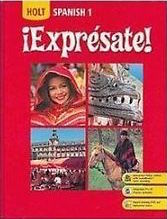
All Solutions
Page 202: 13
The other one is *para almorzar cuando todos tenemos mucha hambre* – to eat for breakfast when we are very hungry.
*Pedir* is specific because in the present tense because in the stem the *e* changes to *i* (except for *nosotros* and *vosotros* forms):
***pedir**: pido, pides, pide; pedimos, pedís, piden*.
The other one is „para almorzar cuando todos tenemos mucha hambre“ – to eat for breakfast when we are very hungry
Pedir is specific because in the present tense, it changes the „e“ in the stem to „i“ (except for in nosotros and vosotros person): pedir- pido, pides, pide, pedimos, pedís, piden.
The other one is „para almorzar cuando todos tenemos mucha hambre“ – to eat for breakfast when we are very hungry
Pedir is specific because in the present tense, it changes the „e“ in the stem to „i“ (except for in nosotros and vosotros person): pedir- pido, pides, pide, pedimos, pedís, piden.
The other one is „para almorzar cuando todos tenemos mucha hambre“ – to eat for breakfast when we are very hungry
Pedir is specific because in the present tense, it changes the „e“ in the stem to „i“ (except for in nosotros and vosotros person): pedir- pido, pides, pide, pedimos, pedís, piden.
The other one is „para almorzar cuando todos tenemos mucha hambre“ – to eat for breakfast when we are very hungry
Pedir is specific because in the present tense, it changes the „e“ in the stem to „i“ (except for in nosotros and vosotros person): pedir- pido, pides, pide, pedimos, pedís, piden.
The other one is „para almorzar cuando todos tenemos mucha hambre“ – to eat for breakfast when we are very hungry
Pedir is specific because in the present tense, it changes the „e“ in the stem to „i“ (except for in nosotros and vosotros person): pedir- pido, pides, pide, pedimos, pedís, piden.
The other one is „para almorzar cuando todos tenemos mucha hambre“ – to eat for breakfast when we are very hungry
Pedir is specific because in the present tense, it changes the „e“ in the stem to „i“ (except for in nosotros and vosotros person): pedir- pido, pides, pide, pedimos, pedís, piden.
The other one is „para almorzar cuando todos tenemos mucha hambre“ – to eat for breakfast when we are very hungry
Pedir is specific because in the present tense, it changes the „e“ in the stem to „i“ (except for in nosotros and vosotros person): pedir- pido, pides, pide, pedimos, pedís, piden.
The other one is „para almorzar cuando todos tenemos mucha hambre“ – to eat for breakfast when we are very hungry
Pedir is specific because in the present tense, it changes the „e“ in the stem to „i“ (except for in nosotros and vosotros person): pedir- pido, pides, pide, pedimos, pedís, piden.
The other one is „para almorzar cuando todos tenemos mucha hambre“ – to eat for breakfast when we are very hungry
Pedir is specific because in the present tense, it changes the „e“ in the stem to „i“ (except for in nosotros and vosotros person): pedir- pido, pides, pide, pedimos, pedís, piden.
The other one is „para almorzar cuando todos tenemos mucha hambre“ – to eat for breakfast when we are very hungry
Pedir is specific because in the present tense, it changes the „e“ in the stem to „i“ (except for in nosotros and vosotros person): pedir- pido, pides, pide, pedimos, pedís, piden.
The other one is „para almorzar cuando todos tenemos mucha hambre“ – to eat for breakfast when we are very hungry
Pedir is specific because in the present tense, it changes the „e“ in the stem to „i“ (except for in nosotros and vosotros person): pedir- pido, pides, pide, pedimos, pedís, piden.

